[339] When I read in a religious paper words like these:
"Perhaps the best thing we can say of God is that he is THE INEVITABLE INFERENCE," I recognize the tendency to let religion evaporate in intellectual terms. Would martyrs have sung in the flames for a mere inference, however inevitable it might be?
Original religious men, like Saint Francis, Luther, Behmen, have usually been enemies of the intellect's pretension to meddle with religious things. Yet the intellect, everywhere invasive, shows everywhere its shallowing effect. See how the ancient spirit of Methodism evaporates under those wonderfully able rationalistic booklets (which every one should read) of a philosopher like Professor Bowne (The Christian Revelation, The Christian Life The Atonement: Cincinnati and New York, 1898, 1899, 1900). See the positively expulsive purpose of philosophy properly so called:--
"Religion," writes M. Vacherot (La Religion, Paris, 1869, pp.
313, 436, et passim), "answers to a transient state or condition, not to a permanent determination of human nature, being merely an expression of that stage of the human mind which is dominated by the imagination. . . . Christianity has but a single possible final heir to its estate, and that is scientific philosophy."
In a still more radical vein, Professor Ribot (Psychologie des Sentiments, p. 310) describes the evaporation of religion. He sums it up in a single formula--the ever-growing predominance of the rational intellectual element, with the gradual fading out of the emotional element, this latter tending to enter into the group of purely intellectual sentiments. "Of religious sentiment properly so called, nothing survives at last save a vague respect for the unknowable x which is a last relic of the fear, and a certain attraction towards the ideal, which is a relic of the love, that characterized the earlier periods of religious growth.
To state this more simply, religion tends to turn into religious philosophy.--These are psychologically entirely different things, the one being a theoretic construction of ratiocination, whereas the other is the living work of a group of persons, or of a great inspired leader, calling into play the entire thinking and feeling organism of man."
I find the same failure to recognize that the stronghold of religion lies in individuality in attempts like those of Professor Baldwin (Mental Development, Social and Ethical Interpretations, ch. x) and Mr. H. R. Marshall (Instinct and Reason, chaps. viii. to xii.) to make it a purely "conservative social force."
Let us agree, then, that Religion, occupying herself with personal destinies and keeping thus in contact with the only absolute realities which we know, must necessarily play an eternal part in human history. The next thing to decide is what she reveals about those destinies, or whether indeed she reveals anything distinct enough to be considered a general message to mankind. We have done as you see, with our preliminaries, and our final summing up can now begin.
I am well aware that after all the palpitating documents which I have quoted, and all the perspectives of emotion-inspiring institution and belief that my previous lectures have opened, the dry analysis to which I now advance may appear to many of you like an anti-climax, a tapering-off and flattening out of the subject, instead of a crescendo of interest and result. I said awhile ago that the religious attitude of Protestants appears poverty-stricken to the Catholic imagination. Still more poverty-stricken, I fear, may my final summing up of the subject appear at first to some of you. On which account I pray you now to bear this point in mind, that in the present part of it I am expressly trying to reduce religion to its lowest admissible terms, to that minimum, free from individualistic excrescences, which all religions contain as their nucleus, and on which it may be hoped that all religious persons may agree. That established, we should have a result which might be small, but would at least be solid; and on it and round it the ruddier additional beliefs on which the different individuals make their venture might be grafted, and flourish as richly as you please. I shall add my own over-belief (which will be, I confess, of a somewhat pallid kind, as befits a critical philosopher), and you will, I hope, also add your over-beliefs, and we shall soon be in the varied world of concrete religious constructions once more. For the moment, let me dryly pursue the analytic part of the task.
Both thought and feeling are determinants of conduct, and the same conduct may be determined either by feeling or by thought.
When we survey the whole field of religion, we find a great variety in the thoughts that have prevailed there; but the feelings on the one hand and the conduct on the other are almost always the same, for Stoic, Christian, and Buddhist saints are practically indistinguishable in their lives. The theories which Religion generates, being thus variable, are secondary; and if you wish to grasp her essence, you must look to the feelings and the conduct as being the more constant elements. It is between these two elements that the short circuit exists on which she carries on her principal business, while the ideas and symbols and other institutions form loop-lines which may be perfections and improvements, and may even some day all be united into one harmonious system, but which are not to be regarded as organs with an indispensable function, necessary at all times for religious life to go on. This seems to me the first conclusion which we are entitled to draw from the phenomena we have passed in review.
The next step is to characterize the feelings. To what psychological order do they belong?















